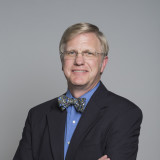Listening to Simon Sinek at the AAFP FMX Breaking Boundaries conference made it clear how important primary care, in general, and family medicine, in particular, is when it comes to improving the U.S. health care system, and how each family physician can make a difference.
First, we must see where we are. It has been said that the U.S. health care system is broken. But it is not broken; it is just misnamed. It is not a health care system. It is a sick care system. The players in the current fee-for-service system are only incentivized for when they provide sick care. And the current system is quite good at delivering high volumes of sick care. Unfortunately, sick care alone does not deliver health. Family physicians and their primary care brethren are in the best position to lead innovation to a true health care system that our country so desperately needs, but that is going to require disruptive innovation; incremental change will not get us there.
Second, we must lead by defining what Mr. Sinek describes as a just cause. We must be focused on creating a system that gives our patients healthier days outside of the hospital, at an affordable cost to both our patients and society. This cannot be done in the current fee-for-service system. There are no billing codes or payments for having a close doctor-patient relationship or for keeping a patient out of the hospital. Therefore, it is imperative for today’s family physicians to learn about and be prepared to lead models that are not based on transactions, but on outcomes. To lead models that are not built on the volume of services rendered, but the value of care delivered. This will not be easy. Our current system is failing our country. Family physicians cannot sit idly by waiting for the system to change.
Finally, I believe that in order to achieve value-based care, physician leaders will have to learn from people who are moving forward with innovative models that are physician-led, delivering better outcomes at a lower cost. Several organizations, like ChenMed, are currently doing this successfully. ChenMed has been serving underserved communities for more than 35 years. They have grown over 30% per year for the last 10 years by delivering high-touch primary care for the neediest patients in a full-risk value-based model. But there are certainly other models from which to learn. Rosencare was founded by a hospitality company fed up with the high cost of care for their employees. They developed their own employer-based care program that has not only delivered outstanding health outcomes for their employees but also used their savings to deliver social justice for the poorest neighborhoods in their area. For people that think an individual physician cannot make a difference, look to the many physicians that have chosen to help their patients and themselves break free of the insurance company bureaucracy by offering subscription model direct primary care. A model that delivers improved access at a much lower cost to the patients, while also thriving as a financial model for the physicians.
Do all these models succeed right out of the gate? No. Groups and physicians working in these models must learn their way forward. Yet physicians who jump through all the hoops to get into and through medical school and residency are familiar with learning their way forward. This does not end when we finish training.
I hear physicians who are afraid of taking a risk. But we take risks every day. Getting out of bed in the morning has a risk of falling attached to it. But then again, as physicians, we know that if we stay in bed, the risk is even greater with the risk of atrophy and blood clots. Howard Marks, the co-chairman of Oaktree Capital, defines risk as simply the possibility that more things can happen than will happen. And as family physicians we see bad things happening every day. We need to lead the way for more positive things to happen in health care. Waiting is not working.
So, I am inviting fellow family physicians to take up the mantle of leadership from wherever you are, to learn about the different care models that deliver better outcomes by taking risks. To learn how to manage these risks for yourself and your patients. To move your current practices and hospital systems toward the care models that will deliver these better outcomes. And if you cannot find kindred spirits where you are, understand that you do have kindred spirits. We are out here, and we support you.
Daniel F. McCarter, MD, FAAFP is the National Director of Primary Care Advancement at ChenMed.
Illustration by Jennifer Bogartz







